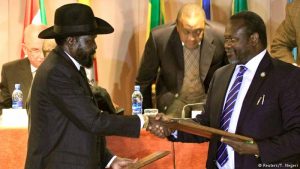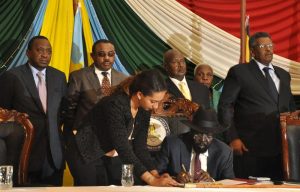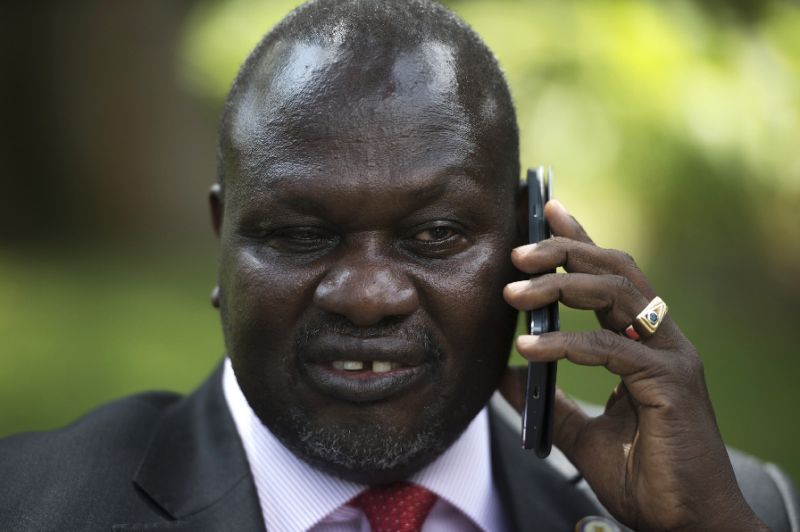By Timothy Sibasi, timothy.sibasi@alleastafrica.com
KAMPALA – Riek Machar was Vice-President of South Sudan a year ago, however, due to ethnic power strives between the Nuwers and the Dinka turned out to be a rebel leader to champion the raising to power of the Nuwers.
His now a de facto prisoner in a farmhouse outside Johannesburg; His far from home and has been isolated from his friends and family, as he gets frozen out of a staggering peace process in South Sudan and the future destiny of his country.
It’s a complex situation for a man who coordinated movements of his troops in South Sudan, met with several diplomats to discuss the leadership question in South Sudan. What is most paining, not even his wife Angelina Teny, can speak to him regularly. “It’s very difficult to stay in touch,” says in a telephone interview with All East Africa from Washington DC.
To speak to Dr. RiekMachar, one needs to go through several contacts of South African Authorities and a couple of individuals who sound to have been central in striking the deal of having arrested and detained in South Africa.

“Even though the South Africans continue to deny it, it is definitely like a house arrest. DrMachar is in a situation where he cannot meet anybody at will, he cannot go anywhere at will, he cannot go outside the country at will. Up to date as we speak he has not met any of the South African leaders since he arrived in South Africa. It is a confinement. He’s not free,” Teny noted.
It is a staggering fall from grace for a man who has long dominated South Sudanese politics. Machar was an instrumental figure in South Sudan’s fight for independence from Sudan, and has served as vice-president twice in the very short history of the world’s newest nation. It became independent in 2011.
He was an architect of South Sudan’s creation, but also of its downfall. Among other factors, tensions between him and President SalvaKiir sparked the bloody civil war that began in 2013 and rages on today, leaving the country devastated in its wake.
A newserge of fighting in July 2016 destroyed a tentative peace deal that had restored Machar to his government post, and forced him to flee the country. With limited options, Machar ended up in South Africa, where he thought he had friends in high places.

But, instead of supporting Machar’s claim to power, the South African government has placed Machar under what amounts to house arrest. Now he can’t even make a phone call without permission.
Attempts to reach Machar for a lengthy talk through the phone of his spokesperson in Kampala could not yield much, “I can’t talk. I have to ask South Africa first,” said the usually verboseMachar, before hanging up. His cellphone number now goes straight to voicemail.
Machar’s family and close associates report similar difficulties getting in touch. “He’s not being allowed to leave South Africa. We can’t speak to him directly. It’s difficult to contact him directly on his phone,” said Lam Paul Gabriel, a Uganda-based spokesperson for Machar’s party, the Sudan People’s Liberation Movement in Opposition (SPLM-IO).
Quite often Machar is reported to be sending small internet text messages. Inside sources that have spoke to Machar have revealed to us that he also doesn’t know why his being held hostage in South Africa. Human Rights activists have intimated to us that if there’s anything wrong he committed by picking arms against a legitimate government he served in South Sudan, then the matters should have been addressed in courts of laws.
ClaysonMonyela is an expert on International Relations and Diplomacy says, “He’s a guest of the government. That’s his status. He’s not under house arrest. He is living under secure conditions, because he has concerns about his own safety.”
Riek’s Passport Confiscated
Sources at the South African embassy in South Sudan that have sought for anonymity have confirmed to the All East Africa that Machar’s passport was confiscated by the South African government, and has subsequently been revoked by South Sudan, in effect leaving him stateless; and that he is allowed only irregular access to a telephone and medical attention.
A source also revealed that some representatives from international organizations involved in mediation in South Sudan peace process have been denied access.
Desperate to make contact with his party, Macharin his only public comment on his situation, in a statement released in May, Machar urged the United Nations to “end the international policy of isolating the SPLM-IO including his release from confinement and detention so as to enable full engagement in finding a peaceful resolution to the conflict in South Sudan”.
But even if Machar were allowed to leave South Africa, would anyone else take him? An attempt to go to Nigeria in November last year ended in failure after Nigeria made it clear that he was not welcome.
Ethiopia on several occasions has also said the same.Machar has now been almost completely sidelined from the various attempts to broker a peace deal for South Sudan. Attempts for the South Sudan envoy Ramaphosa to meet with Machar in South Africa for the last 11 months have also collapsed on its own weight.
“I don’t know if he will ever go home,” said one high-profile South African politician involved in mediation efforts, speaking incognito.
IGAD Loses Focus To Strike Peace Deal In South Sudan
Machar’s enforced exile has serious implications for South Sudan’s peace process, which has ground to a halt. There is little agreement among the international community on how to move forward, even as violence increases and the humanitarian situation continues to deteriorate.
Various arbiters, including Uganda, South Africa and the Intergovernmental Authority for Development (Igad), are pursuing parallel negotiation tracks. It seems that none is interested in having Machar around for these talks.
South Sudan’s ambassador to South Africa, Philip Jada Natana, said: “The only thing I know about [Machar’s] presence here is that the countries of Igad have said that they didn’t want him to be in the region, because his presence in the region would be detrimental to the implementation of the peace process. That is when South Africa decided to host him.”
There is little doubt that the situation in South Sudan has worsened in Machar’s absence.
“It’s causing a lot of confusion back at home, because he’s our commander-in-chief. This is prolonging the war. The presence of Machar in South Africa is causing a lot of suffering in South Sudan at the moment,” said the SPLM-IO’s Gabriel.
Miamingi Remember, an analyst based at the University of Pretoria’s Centre for Human Rights, saysMachar’s exclusion from peace talks has made these talks much less likely to succeed.
“If the exclusion of Machar was to allow for a reduction in the armed conflict, and therefore … create a better working relationship in the capital Juba that will make the central government a viable partner for peace, it has failed on a scale that is monumental. Its impact on obtaining a sustainable peace is disastrous. The question now is: Will the region and the international community be humble enough to say, ‘We’ve made a mistake’?”
South African civil society groups have urged the government to be more transparent about its intentions for both Machar and South Sudan.
“We call on the government to openly and transparently explain the terms and conditions of SPLM-IO leader RiekMachar’s long-term stay and status in South Africa, which remains shrouded in mystery, and fuels confusion among actors who are actively working to promote peace in South Sudan,” said FriederikeBubenzer, a senior project leader at the Institute for Justice and Reconciliation.
Copyright ©2017 Alleastafrica.com All rights reserved. The information contained in Alleastafrica.com may not be published, broadcast, rewritten, or redistributed without the prior written authority of Alleastafrica.com



